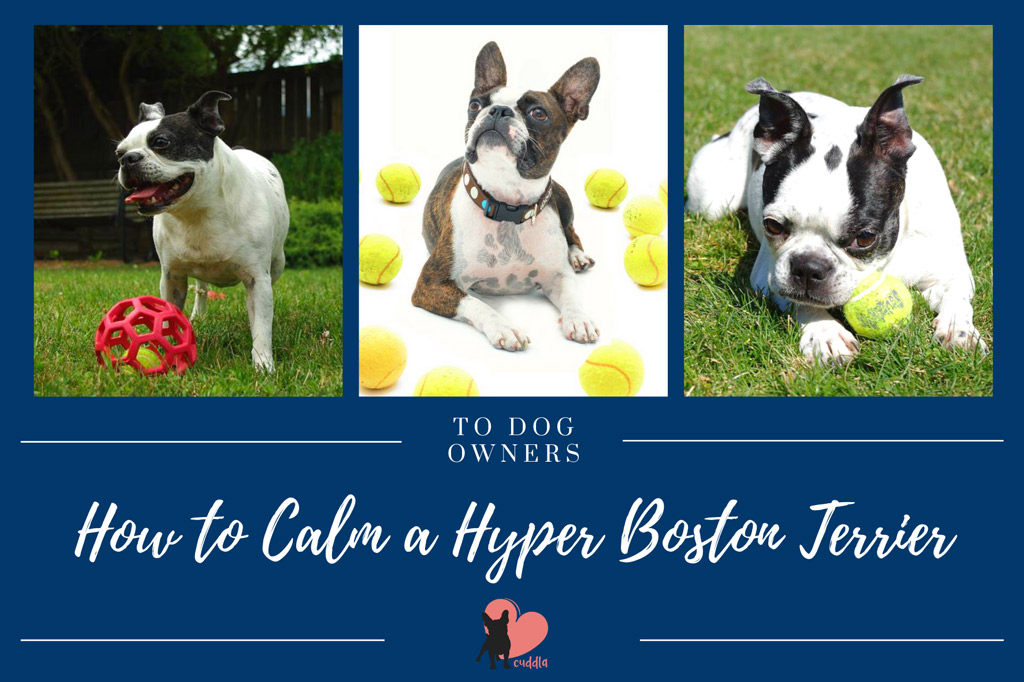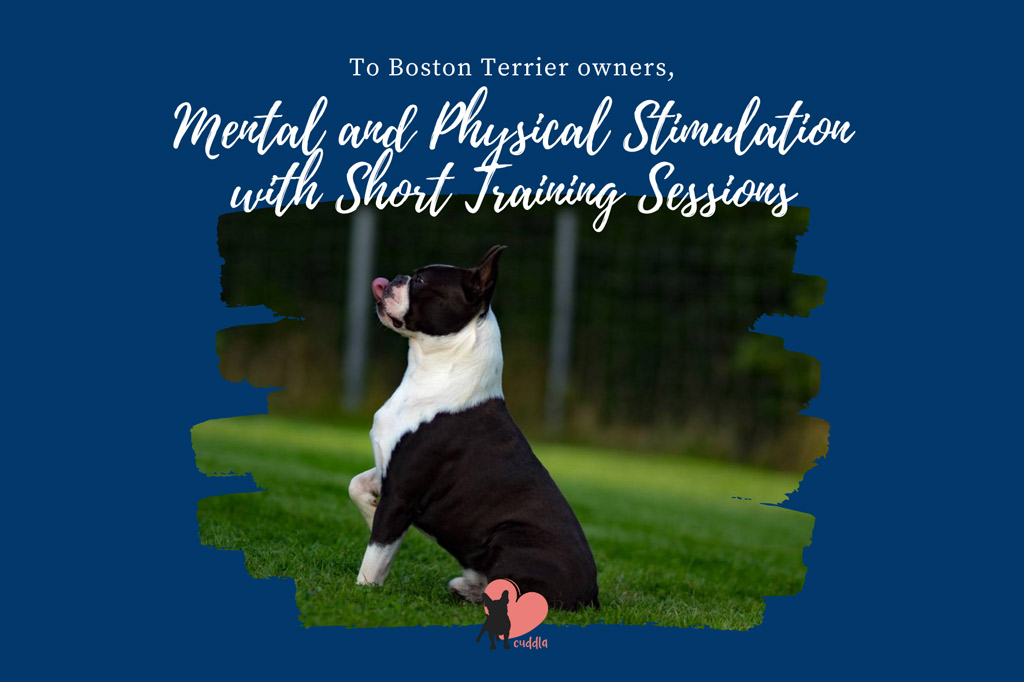
Does your Boston Terrier zoom around the house or garden? Or is your Boston Terrier hyper? You are not alone! And your Boston is not going crazy; he just has too much energy bottled up.
Here’s what you need to know about hyper Boston Terriers, why dogs “zoom” and how to calm your hyper dog.
Hyper Boston Terriers
If you have a very active Boston terrier, you might think that your pup is hyperactive. But there’s more than meets the eye…
Dr Karen Becker explains that hyperactivity in dogs exists, but it’s a rare condition in dogs.
In order for your Boston Terrier to be hyperactive, he should have most or all of the following symptoms (source):
- Increased resting heart and respiratory rates.
- Failure to adjust to common stimuli like everyday household noises and activities.
- Agitation.
- Reactivity.
- Sustained emotional arousal and an inability to settle down.
- Paradoxical calming response to amphetamines (i.e. your dog doesn’t respond as expected to the stimulant).
So, unless your Boston has most of these symptoms, then clinically speaking, he’s not hyper.

Are Boston Terriers Hyper?
So, why does your Boston behave like he’s got so much energy?
Boston Terriers are not hyper, but they can be energetic, especially when young. Boston Terriers have high energy levels and short outbursts of energy (some will say spurts of hyperactivity or zooming). Also, they are vigorous and are a very playful breed.
This means that they need plenty of exercise and playtime to burn that extra energy.
On average, an adult Boston Terrier needs an hour of daily exercise, although some are happy to go longer. It’s part of the breed’s temperament.
Plus, Boston Terriers tend to be more energetic (which some refer as hyper) when they are young.
Some owners report that males Boston Terriers are a little more full-on than females. However, every dog, even of the same breed, is an individual and some will be more energetic than others.
If a Boston gets enough exercise, he will settle down after a good session of training, playtime or a walk. But, often a Boston Terrier will be more hyper (energetic) if he is not receiving the exercise and mental stimulation he requires.
Why Do Boston Terriers Zoom Around?
Even if your Boston Terrier is getting enough mental and physical stimulation, he can still (in many different ways of saying it):
- Zoom around.
- Act crazy.
- Engage in frapper fugues.
- Or get the zoomies.
Regardless of how you refer to this behaviour…
It will look like your Boston suddenly runs around you like crazy, or chases his tail (moves in circles and spinning fast)… Usually, he will end up exhausting himself.
Boston Terriers zoom to let out that excess of energy. It’s mostly common in puppies and younger dogs. Plus, zooming is normal canine behaviour.
The technical name for this sudden burst of energy (also referred to as dog zoomies) is Frenetic Random Activity Periods or FRAPS (source). Generally, this only lasts a few minutes at most.
Sometimes, zooming is a happy outburst of energy. But, it can also be an indication that your pup is anxious. He might be trying to relieve the anxiety by burning off nervous energy.
When this happens, feel free to let your pooch burn that energy, just make sure that your pooch can zoom safely without hurting himself. Zooming is fine in an enclosed and safe environment, like the back garden.
Do Boston Terriers Calm Down with Age?
When do Boston Terriers slow down?
Boston Terriers calm down with age if they get enough mental and physical stimulation. Otherwise, they will still get energy outbursts.
Puppies go for short bursts of activity, and then they take a rest. Remember that puppies sleep around 18 to 20 hours a day!
Between 12 to 14 months, a Boston Terrier will reach adulthood. He will settle into a grown-up personality (maturity and temperament) and will stop physically growing. However, he will still be/have high energy.
From around 7 to 8 years of age, a Boston Terrier becomes a senior dog. He will still be very active but he will be a little more laid back.
Read also: Boston Terrier Growth Stages and Puppy Development Chart.

How to Calm a Hyper Boston Terrier
Boston Terriers zooming around from time to time is fine, but an overly boisterous dog (charging at you, jumping, bumping into stuff) can be a sign of lack of stimulation.
Without the opportunity to release all that pent up energy and to challenge their minds, Boston Terriers get bored and can develop behaviour problems.
This can include:
- Barking.
- Digging.
- And destructive behaviours.
Apart from providing physical and mental stimulation, you also want to relax his over-aroused and excited mind.
Here are six options to help calm a boisterous Boston Terrier:
#1 – Lengthen The Daily Walks
It’s easy to underestimate the power of simple solutions like walking.
Daily exercise is crucial to tire out and settle your Boston. Walks provide physical exercise and mental stimulation (think of all the sniffing around, meeting new people and dogs, etc.)
It’s always best to follow a consistent exercise routine (daily walks, for instance) than a big workout over the weekend, which can cause an injury and you can also end-up overexercising your dog.
Ideally, you should exercise for Boston Terrier for an hour a day.
This can be broken down into one long walks, some playtime and a short training session if your schedule allows it.
The diversity is refreshing and allows you to challenge your Boston at the same time. That is what I like to do daily. When I am not able to do it, my dogs tend to get frustrated (especially the energetic ones – Terriers are those sort of dog breed!).
My schedule is more flexible since I work from home, but if you need some extra help, check out my favourite dog care options!
Read also: How Much Exercise Do Boston Terriers Need? Age-Specific – a guide to exercise needs.

#2 – Purposeful Playtime and Activities
There are many other ways to exercise your Boston Terrier including playing games and doing activities together.
Boston Terriers love attention and spending time with their owners. Some suggested activities for a Boston Terrier include:
- Fetch games – a tennis ball thrower for a higher intensity workout, rubber frisbee or squeaky ball.
- Tug games – all you need is a bone with rope toy.
- Scent games – you can use a snuffle mat.
- Agility – set up an agility set in your garden.
- Swimming.
- Learning new commands and tricks.
Check my Boston Terrier toy guide to discover endless possibilities for fun!
Read also: What Are The Best Activities for Boston Terriers? – for how to put those exercise ideas into practice.
#3 – Mental and Physical Stimulation When Alone
As stated, mental exercise can tire a dog just as much as physical activity.
Boston Terriers are smart and failure to challenge their minds can lead to boredom.
Boredom is one of the main causes of behavioural problems in dogs such as barking, destructive behaviour, and even escaping. These are some suggested ways to provide mental stimulation for your Boston terrier:
- Puzzle toys like Snuffle Mat and Trixie (which comes with different levels).
- Dispenser toys like Kong (options for all ages), you can never go wrong with this one. Once you show your pooch how to get the food inside… you are all set!
- Chewing toys like Puppy Goodie Bone for teething and Nylabone Dura Chew Flavored Bone for adults.
- Digging toys like iFetch iDig Digging Toy.
- Sound toys like Kong Squiggles (squeaky sound).

#4 – Training to Encourage a Calm Behaviour
Over excitement is a state of mind. A very energetic (hyper) Boston Terrier is an over-aroused dog.
Instead of encouraging his energetic responses, reward calm attitudes.
If you are speaking in a high pitched voice to an already excited Boston Terrier, you will excite him even more.
Insiders Tip: To communicate calmly, first let go of the tension in your body (take a deep breath and release slowly), then in a calm and controlled voice, redirect his energy to a task – like a sit command.
Always reward your Boston when he’s calm with praise or a treat, this will reinforce his calm behaviour.
A positive reward training goes a long way and it’s very effective to house-train your Boston Terrier puppy.
Generally, there are 3 most common challenges you are likely to face with your Boston Terrier house training efforts:
- Potty training.
- Leash pulling.
- Biting/nipping.
If any of those are something you’re having trouble with, I may be able to help with that.
Click here to visit our Dog Training Essentials, where you will get a free 3-part mini audio series + the everyday resource used by a well-known dog trainer.
You can also get this using the button below. Happy training! 😉
#5 – Relaxing Your Boston Terrier’s Senses
You can play calm, soothing music or white noise sounds (both available on Amazon) before a possible stressor occurs or when you want to encourage calm behaviour.
These sounds tend to relax dogs. Plus, they have the added bonus of drowning out distressing and distracting noises.
Another calming option for the senses is to use lavender essential oil in a diffuser. This I have personally found works wonders on my dogs (and me)! 🙂
Sometimes, I place two drops on the dog’s bedding before leaving the house to encourage a soothing nap.
Read also: Boston Terrier Fears and Anxiety – Triggers and Remedies.

#6 – Give a Gentle Massage or Calm Hold
Massaging your Boston and talking softly helps in most cases since Bostons like physical contact and snuggling next to their owners.
You can give your Boston a home massage by rubbing his belly gently. You can put your pooch on your lap or next to you while doing this. Some will definitely fall sleep on your lap after a few minutes! 😉
Insiders Tip: Do this after exercise or a training session when your dog is more likely to wind down since he’s likely tired and will be in a less active state.
Here’s a step-by-step guide on what and how you can do this:
- Begin by gently stroking his forehead and the bridge between the eyes.
- Rub your thumbs in slow, small circles on the outside edges of his ears. These points have many nerve endings, so rubbing the area releases endorphins to his brain giving him a feel-good calming effect.
- Then, gradually move down his neck and towards his belly. Make sure that your Boston is comfortable and that he’s enjoying your caresses.
- You want to start with short sessions and gradually make them longer as he learns to relax.
Finally, you can end with a calm hold technique, which is also very useful when you are outdoors and your Boston gets excited.
This technique is used to settle down a dog, and here’s what you do:
- Simply place your hand on one of your dog’s shoulder and hold him still. There’s no need to make eye contact or talk, your hold and contact should be enough.
- You can hold your pooch gently by the collar if he’s off-leash, or use the leash to prevent him from moving away from you. Personally, I also kneel to stay closer to him whilst holding the leash.

My Boston is hyper ,I play take him out he has my entire attention, still he runs around the house and won't go to bed at night ..
I am frustrated altho I love him and will keep him …
I just wanted to say that this is the best blog I’ve read in a long time ! bravo !!! I just became the proud mom of a purebred Boston terrier Girl her name is Charly she is 14 weeks old and a ball of energy but also loving and caring nature too .
has a older Pal Sami. Bostillian Mom Boston terrier Dad Papillon she is 13 and a sweet calm girl . Your blog is fabulous can’t wait to read more !
Regards
Colleen Jenkins
Caistor Centre Ontario Canada
Congratulations, Colleen, that’s wonderful news!! And glad to hear that you’re enjoying your time here 🙂